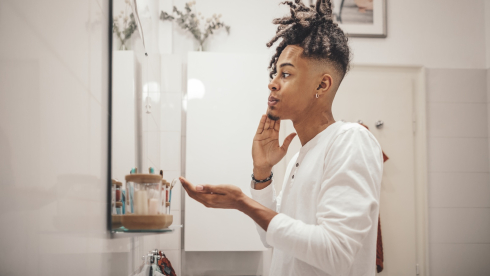I hope I don’t get those generic Mother’s Day texts from people who haven’t inquired about me in years. Those three words ("Happy Mother’s Day"—or, perhaps, "HMD" in this modern, 140-character world) mean so much less than, "how are you?" I asked my grandmother that question yesterday on the year anniversary of my father’s death. He was her only son, and I was checking on the woman who taught me how.
I spent my childhood summers with my grandmother, watching soap operas, eating non-processed food, and witnessing things that I would only appreciate two decades later. One of which was her treatment of the “sick and shut-in.” Those were the words printed in bold above a list with names and addresses in our church bulletin. Sick. Shut-in.
I don’t know what those words mean in communities today. To my grandmother, it meant more than a Hallmark card, though she had a basketful for all occasions. To her, it meant that she packed up her granddaughter and drove around town seeing about the church members on that list.
Hallmark sells sentiment, not community, and my grandmother taught me that sentiment won’t make us well.
I’ve spent some time in stifling heat that the boxed fans only moved around the room. I’ve seen thick, dark dust that I dared not mention. I’ve learned needlepoint on the end of my Sunday School teacher’s bed. My grandmother taught me that seeing about people meant sitting with them, being with them in whatever state they found themselves. It meant that houses were not islands, but places with open doors and sitting rooms. It meant accepting a glass of water when you weren’t thirsty, or getting up and pouring it when a person was unable to. It meant telling caregivers to go and take a break, and playing with children I didn’t know while the grown folks talked. It meant community.
Hallmark sells sentiment, not community, and my grandmother taught me that sentiment won’t make us well. My grandmother has a sharp tongue and quick wit; she isn’t the flowery word type. She only spoke a few Baptist maxims, but they were sometimes followed with a chuckle or an “I guess,” that showed that she knew that they weren’t meant to be taken as absolute truth. Truth was what you created—a phone call, a visit, a handwritten note. “Everything will be alright” meant nothing without a follow-up question about how she could help to make it so. “He doesn’t give us more than we can bear,” means little unless you are willing to help carry the weight when God miscalculates a friend’s threshold.
These are things I didn’t know I knew until I needed them to be true for me.
We need community.
Here’s another truth: if given the option, I wouldn’t face most days. That attitude is a symptom of an illness that, in this society that generates disconnection, seems like plain common sense. People are in a lot of pain. We are in a lot of pain. We need community.
As I prepare to move to a new city, I wonder if I’ll be able to build the community I need. Imagining my community-building tasks in my grandmother’s voice helps me believe that I will. Get close with at least one family with children. Be there for them should they have an emergency. Give each other breaks. Put some money into a joint emergency fund. Lend and borrow money from this fund before you stand at the counter of a pawn shop and allow a stranger to determine the value of precious things. Spend time with children but learn how to make quiet when you need to spend time with yourself. Spend time with grown folks and know when it’s time to leave. Meet the young people in your neighborhood. Have them over from time to time but don’t let them drink up all your good drink. Meet the old people in your neighborhood; they know more than you do. See about people; they’ll surely see about you.
So on this Mother’s Day, I will only send the cards that I make with my daughter. I want to teach her, like my grandmother taught me, how to love in her own language and spend her time.













